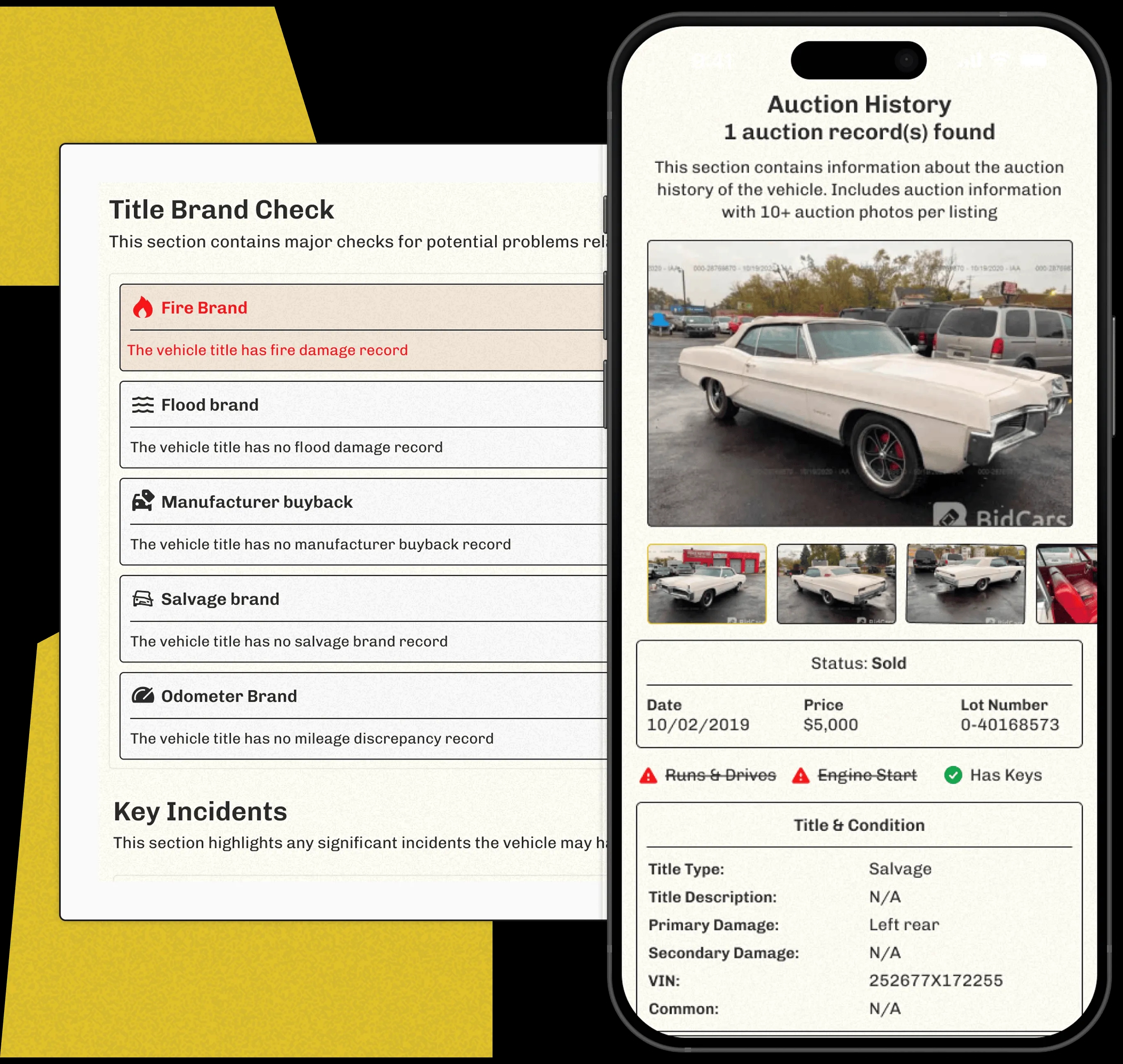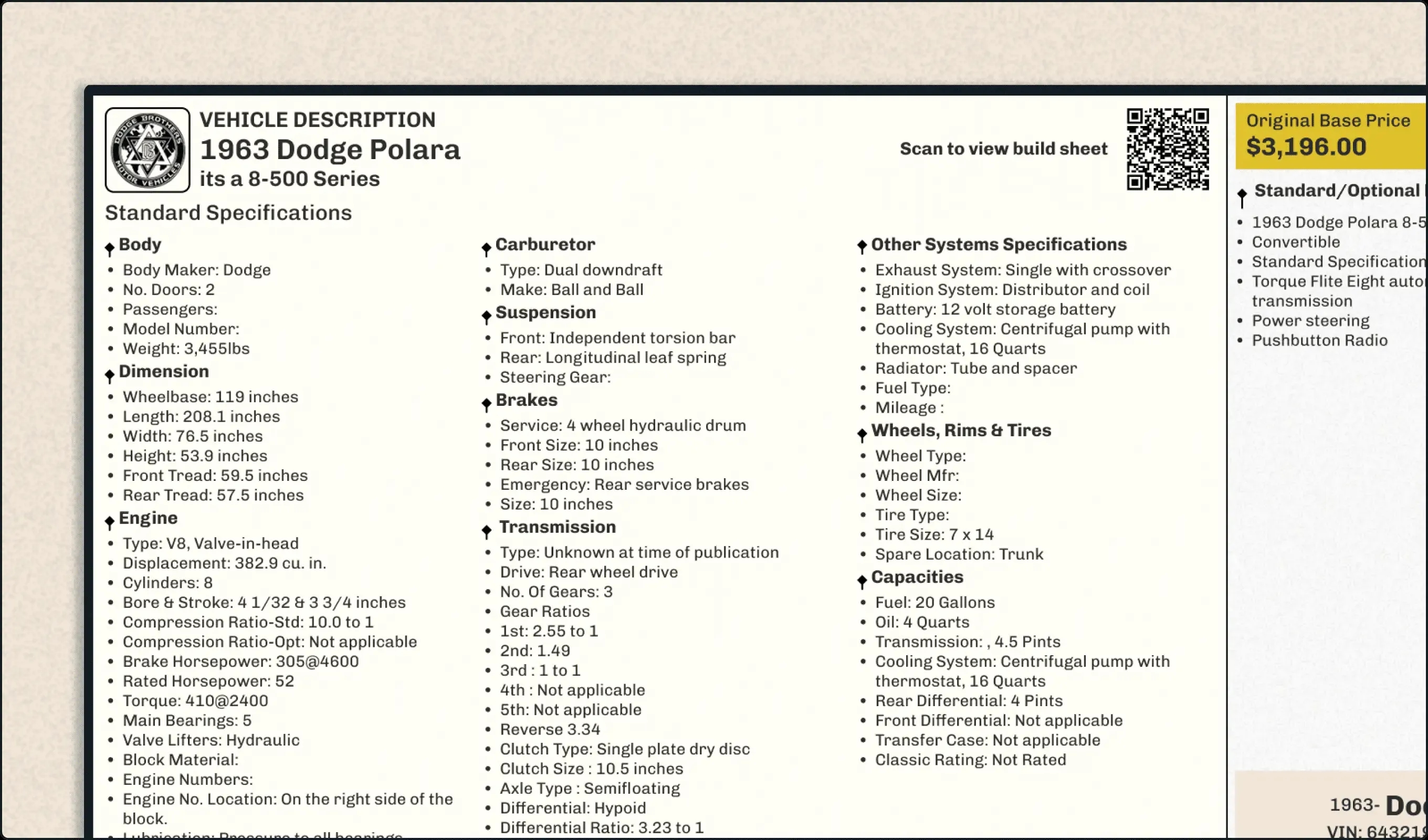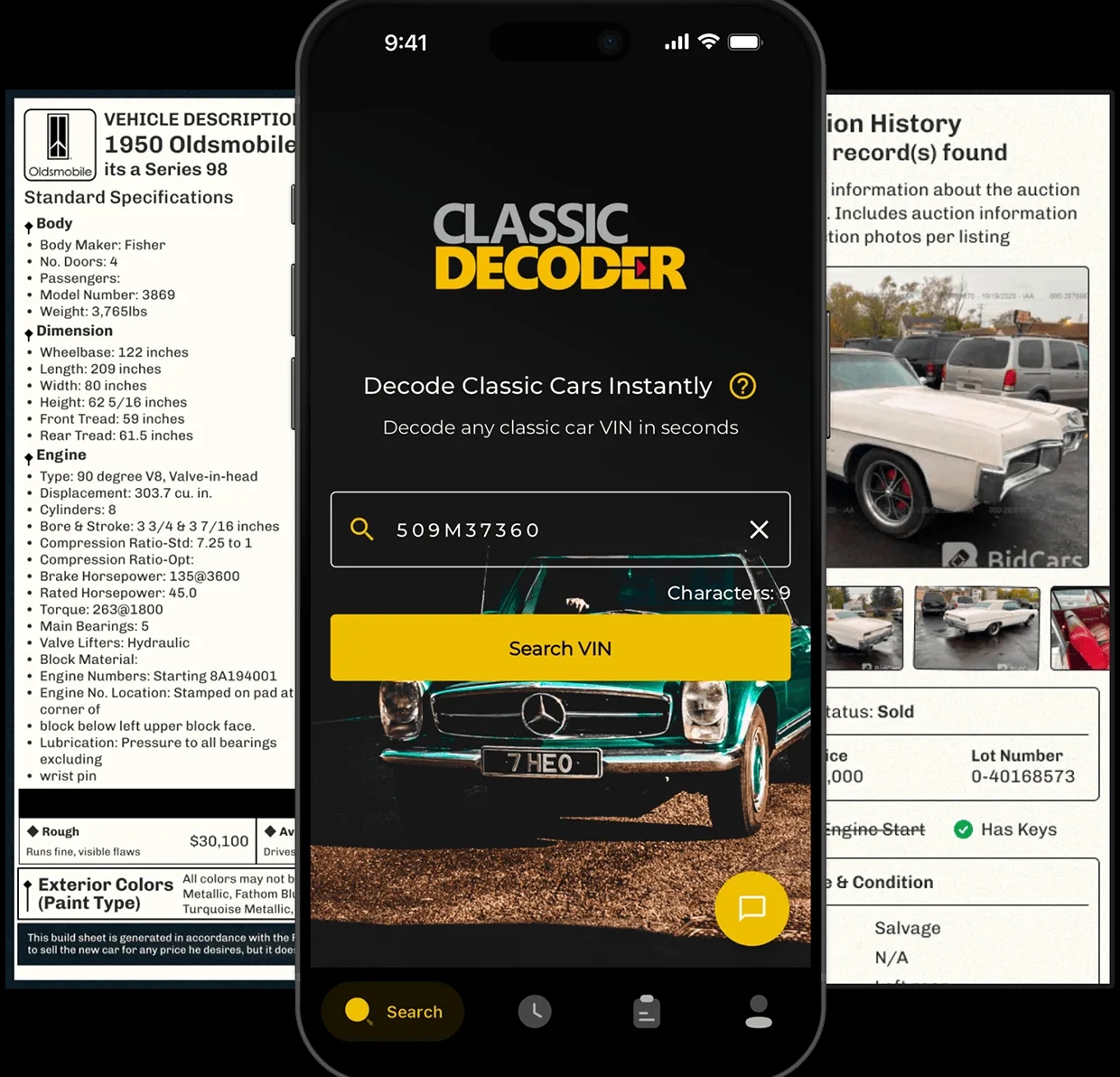1968 Chevrolet Impala
The '68 Impala: a huge, stylish muscle car! Iconic in movies & TV, it symbolized American power and optimism (before things got, uh, complicated in '68). That long hood, sculpted body, and massive tail lights? Pure '60s cool. A true classic.
Decode Classic VINs to Get Vehicle History Report and Build Sheet
The Legacy of the 1968 Chevrolet Impala
The 1968 Chevrolet Impala is a classic that, like a fine wine, has only appreciated in allure and cultural significance over the years. With its stylish design and robust performance, it became a favorite among car enthusiasts and collectors. But it's not just the petrol-heads with a soft spot for the Impala—this car has wooed its way into pop culture and the garages of some famous auto buffs, adding a sprinkle of star-studded glamor to its legacy.

1968 Chevrolet Impala Models:
Select the vehicle's model to see the correct data for it.
How Much is Chevrolet Impala Worth?
Original MSRP :$3,245.00
Outstanding
Clean
Average
Rough
1968 Chevrolet Impala Specs
Interested in buying a classic car or selling one?
Access detailed history reports for classic vehicles from hundreds of manufacturers.
- Accident Records
- Theft Records
- Loan & Lien Information
- Auction Information
- Salvage Information and more

History of the 1968 Chevrolet Impala
Back in the late 60s, the Impala line was repositioning itself from just another family car to a statement of style and power on the roads. 1968 saw the Impala take on a sleek new body style—aggressive lines and improved aerodynamics captured the zeitgeist of American automotive design. This model became not just a car, but a symbol of freedom and youth, cruising down roads to the soundtrack of an era popping with revolutionary rock 'n roll and daring attitudes.
Learn more about a classic car: Get Build Sheet by VIN.
Access reproduced classic build sheets to learn more about your classic vehicle details.
- Standard Specifications
- Original Base Price
- Standard & Optional Equipment
- Exterior & Interior Colors
- VIN ID & Location description

1968 Chevrolet Impala Detailed Specifications
Under the hood, buyers had a buffet of engine options. From a modest 250 cubic inch six-banger to a mighty 396 cubic inch V8, the Impala catered to a range of preferences. And if performance was your bread and butter, the "Super Sport" (SS) package was yours for the taking. Power steering and brakes became more common, morphing this beast into something truly luxurious.
Performance Highlights
The SS variant, with its ferocious 427 cubic inch (7.0 L) V8 engine, was all about performance. It wasn't just about getting from A to B; it was about how fast you could get there. Achieving 0 to 60 mph in about 6.5 seconds, the Impala SS could hold its own in a drag race.
Famous Figures Who Own a 1968 Impala
Jay Leno
Jay Leno, the automotive aficionado with a car collection that could rival a small dealership, recognizes the Impala's place in the tapestry of American car culture. His impressive collection includes many classic wonders, and his appreciation for vintage cars extends to this emblematic Chevrolet.
Beyoncé
Beyoncé's car collection speaks to her luxurious taste, featuring classics like the 1959 Rolls-Royce Convertible Silver Cloud she received from Jay-Z. While the Impala itself isn't part of her collection, it shares the red carpet appeal found in these classic icons.
1968 Chevrolet Impala Gallery














Fun Facts about the 1968 Chevrolet Impala
The Impala's name derives from an African antelope, symbolizing grace and speed—qualities the car embodies.
It became a cultural icon depicted in numerous films and TV shows. Remember "Boyz n the Hood"? Yes, that Impala was a nod to its legendary status.
Car club scenes in the 70s and 80s embraced the Impala, birthing an entire subculture around lowriders and cruises, solidifying its image as a canvas for self-expression.
Interested in Buying or Selling a Classic Car?
When you're in the market for a or perhaps falling head over heels for a beauty like the Impala, knowing the vehicle's past is essential. That's why checking things such as accident and is practical and, frankly, quite exciting.
Accident Records
Theft Records
Loan & Lien Information
Auction Information
Salvage Information and more
Trying the can reveal secrets the car keeps tucked beneath its polished exterior. For those pre-1981 gems, a can shed light on their unique storylines. Whether you're selling or just curious, a is a handy tool for getting the complete plot behind your ride.
Classic VIN Decoder App |Now available on both Android and iOS!
At Classic Decoder, we believe that developing a mobile app is a great way to extend our classic car data solution hub to as many users as possible across the globe. Our app is built with users and precision in mind. It holds the key to unlocking the history and details of any retro car at your fingertips. It also comes with fascinating and user-friendly features that make it stand out from other mobile apps designed for this purpose.
The Classic Decoder app lets you decode and lookup any classic VIN in a flash. Access accurate vehicle information and history, make an informed decision faster, and buy and trade in classic cars with confidence.

Download The Classic Decoder App now.
Some unique features include:
- Support all classic VIN lengths from 5 to 13 digits
- Support classic cars produced from 1910 – 1980
- Online Garage features – to add and manage your vehicles
- 24/7 Customer Support
- Easy onboarding for first-time users
Explore Chevrolet Impala from Other Years
Frequently Asked Questions
The '68 Impala? Oh man, it's a classic! Think long, sweeping lines; that's the key. It's instantly recognizable, you know? A really iconic profile. The Coke bottle shape of the body is what most people remember, and it's got that signature long hood and short deck. Plus, those huge tail lights – they're unmistakable. It's like, if you saw a photo of a '68 Impala, you'd just know what it was. Some might say it's even better looking than some of the newer cars – but hey, that's just my humble opinion. The details, though, like the trim and badging, vary quite a bit depending on the model and options. So, really, there's a '68 Impala for everyone.
Okay, so under the hood – that's where things get interesting. You could get everything from a pretty small-ish six-cylinder engine for everyday driving, though those are pretty rare these days, to monstrous big-block V8s that could, let's just say, move the car quickly. Think of it like this: you could have a reliable daily driver, or a real muscle car. The 327 and 350 small-block V8s were popular choices, offering a good balance of performance and fuel economy (relatively speaking, of course!). Then you've got the real muscle car monsters – the 396 and 427 big-block V8s were top-of-the-line, serious powerhouses. Those were the beasts. It’s just what you wanted for some real highway horsepower. Choosing the right engine really depended on what the buyer wanted to do with the car – and of course, what their budget was like back then.
That's a tricky one. Reliability depends heavily on how well the car has been maintained. Think of it like an old house; regular upkeep makes all the difference. A well-maintained '68 Impala can be surprisingly reliable, even today, (though parts might be a little harder to come by). But a neglected one? Yeah, it might end up costing you a pretty penny. Lots of parts are still available, thankfully; but finding someone who knows how to work on these old beauties is a key factor too. So, a lot of it has to do with the individual car's history and the current owner's dedication to keeping her running smoothly. You've gotta love that old girl!
Pricing is all over the map, my friend. It really depends on several factors: condition (obviously!), options (those power windows and AC make a difference), mileage (lower is generally better), and the overall level of restoration (or lack thereof). You’ll find anything from project cars that need a ton of work (and, thus, are cheapish) all the way to concours-quality, beautifully restored examples that fetch a pretty high price. A really top-notch one? You might need a pretty hefty bank account. A quick online search or checking out some collector car price guides will give you a better ballpark figure, but keep in mind that these are estimates. It's a bit of a game of supply and demand, plus condition.
Thankfully, there's a pretty big network of suppliers for these classic cars. You'll find parts through online retailers specializing in classic car parts; lots of them cater specifically to Chevys. Then, there are also parts swaps and classic car shows – you can sometimes score some great deals. Plus, there are specialized restoration shops – those are a real lifesaver if you're not a DIY mechanic. Don't underestimate the power of online forums and communities, either; you can find a wealth of knowledge and helpful folks willing to share their sources. Just remember, parts can be a bit pricier than you might think sometimes.

